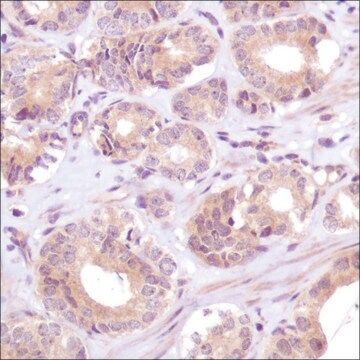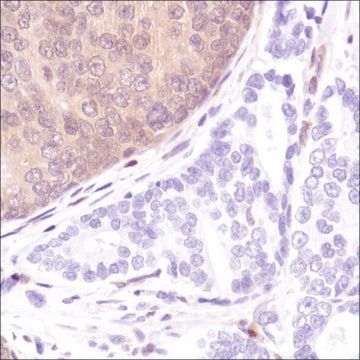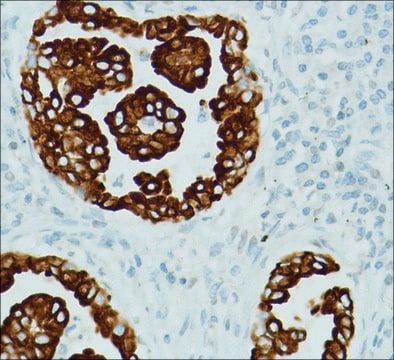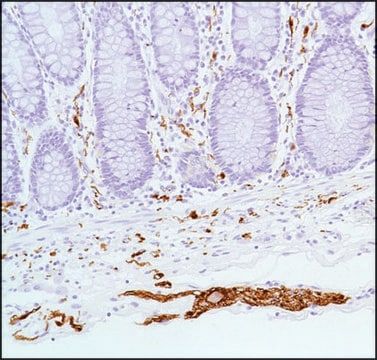SAB5500168
Anti-PTEN antibody, Rabbit monoclonal
clone SP170, recombinant, expressed in proprietary host, affinity isolated antibody
Manufacturer: Sigma Aldrich
Select a Size
| Pack Size | SKU | Availability | Price |
|---|---|---|---|
| 100 μL | SAB5500168-100-μL | In Stock | ₹ 57,364.80 |
SAB5500168 - 100 μL
In Stock
Quantity
1
Base Price: ₹ 57,364.80
GST (18%): ₹ 10,325.664
Total Price: ₹ 67,690.464
biological source
rabbit
Quality Level
100
recombinant
expressed in proprietary host
conjugate
unconjugated
antibody form
affinity isolated antibody
antibody product type
primary antibodies
clone
SP170, monoclonal
species reactivity
human (tested)
species reactivity (predicted by homology)
dog, mouse
technique(s)
flow cytometry: 1:400immunoblotting: 1:100immunohistochemistry: 1:100
Description
- General description: Phosphatidylinositol-3, 4, 5-trisphosphate 3-phosphatase and dual-specificity protein phosphatase (PTEN) is a tumor suppressor and a member in the PI3K/PTEN/AKT pathway. PTEN is a phosphatase with dual specificity to slow cell growth and antagonize the growth promoting activities from HER protein kinases. The defects of PTEN, mostly around the C-terminus of PTEN, have been implicated in many human cancers and diseases. Therefore, antibody to the N terminus will not be able to detect most of the PTEN protein loss.
- Immunogen: Synthetic peptide close to the N-terminus of human PTEN protein.
- Features and Benefits: Evaluate our antibodies with complete peace of mind. If the antibody does not perform in your application, we will issue a full credit or replacement antibody. Learn more.
- Physical form: 0.1 ml rabbit monoclonal antibody purified by protein A/G in PBS/1% BSA buffer pH 7.6 with less than 0.1% sodium azide.
- Disclaimer: Unless otherwise stated in our catalog or other company documentation accompanying the product(s), our products are intended for research use only and are not to be used for any other purpose, which includes but is not limited to, unauthorized commercial uses, in vitro diagnostic uses, ex vivo or in vivo therapeutic uses or any type of consumption or application to humans or animals.
SAFETY INFORMATION
WGK
WGK 2
Flash Point(F)
Not applicable
Flash Point(C)
Not applicable
Compare Similar Items
Show Difference
biological source: rabbit
Quality Level: 100
recombinant: expressed in proprietary host
conjugate: unconjugated
antibody form: affinity isolated antibody
antibody product type: primary antibodies
clone: SP170, monoclonal
species reactivity: human (tested)
species reactivity (predicted by homology): dog, mouse
technique(s): flow cytometry: 1:400immunoblotting: 1:100immunohistochemistry: 1:100
biological source:
rabbit
Quality Level:
100
recombinant:
expressed in proprietary host
conjugate:
unconjugated
antibody form:
affinity isolated antibody
antibody product type:
primary antibodies
clone:
SP170, monoclonal
species reactivity:
human (tested)
species reactivity (predicted by homology):
dog, mouse
technique(s):
flow cytometry: 1:400immunoblotting: 1:100immunohistochemistry: 1:100
biological source: rabbit
Quality Level: 100
recombinant: expressed in proprietary host
conjugate: unconjugated
antibody form: affinity isolated antibody
antibody product type: primary antibodies
clone: SP218, monoclonal
species reactivity: human (tested)
species reactivity (predicted by homology): mouse, dog, frog
technique(s): flow cytometry: 1:200immunoblotting: 1:400immunohistochemistry: 1:200
biological source:
rabbit
Quality Level:
100
recombinant:
expressed in proprietary host
conjugate:
unconjugated
antibody form:
affinity isolated antibody
antibody product type:
primary antibodies
clone:
SP218, monoclonal
species reactivity:
human (tested)
species reactivity (predicted by homology):
mouse, dog, frog
technique(s):
flow cytometry: 1:200immunoblotting: 1:400immunohistochemistry: 1:200
biological source: rabbit
Quality Level: 100
recombinant: expressed in proprietary host
conjugate: unconjugated
antibody form: affinity isolated antibody
antibody product type: primary antibodies
clone: SP167, monoclonal
species reactivity: human (tested)
species reactivity (predicted by homology): mouse, bovine
technique(s): flow cytometry: 1:400immunofluorescence: 1:100immunohistochemistry: 1:100
biological source:
rabbit
Quality Level:
100
recombinant:
expressed in proprietary host
conjugate:
unconjugated
antibody form:
affinity isolated antibody
antibody product type:
primary antibodies
clone:
SP167, monoclonal
species reactivity:
human (tested)
species reactivity (predicted by homology):
mouse, bovine
technique(s):
flow cytometry: 1:400immunofluorescence: 1:100immunohistochemistry: 1:100
biological source: rabbit
Quality Level: 100
recombinant: expressed in proprietary host
conjugate: unconjugated
antibody form: affinity isolated antibody
antibody product type: primary antibodies
clone: SP127, monoclonal
species reactivity: human (tested)
species reactivity (predicted by homology): mouse, rat, bovine
technique(s): flow cytometry: 1:100immunohistochemistry: 1:100
biological source:
rabbit
Quality Level:
100
recombinant:
expressed in proprietary host
conjugate:
unconjugated
antibody form:
affinity isolated antibody
antibody product type:
primary antibodies
clone:
SP127, monoclonal
species reactivity:
human (tested)
species reactivity (predicted by homology):
mouse, rat, bovine
technique(s):
flow cytometry: 1:100immunohistochemistry: 1:100



